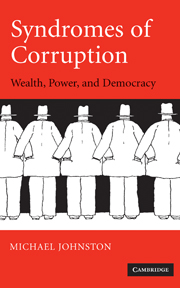Book contents
- Frontmatter
- Contents
- List of figures
- List of tables
- Preface
- 1 Wealth, power, and corruption
- 2 The international setting: power, consensus, and policy
- 3 Participation, institutions, and syndromes of corruption
- 4 Influence Markets: influence for rent, decisions for sale
- 5 Elite Cartels: how to buy friends and govern people
- 6 Oligarchs and Clans: we are family – and you're not
- 7 Official Moguls: reach out and squeeze someone
- 8 From analysis to reform
- Appendix A Countries in each cluster and distances from statistical cluster centers
- Appendix B Statistical indicators for country clusters
- References
- Index
6 - Oligarchs and Clans: we are family – and you're not
Published online by Cambridge University Press: 22 September 2009
- Frontmatter
- Contents
- List of figures
- List of tables
- Preface
- 1 Wealth, power, and corruption
- 2 The international setting: power, consensus, and policy
- 3 Participation, institutions, and syndromes of corruption
- 4 Influence Markets: influence for rent, decisions for sale
- 5 Elite Cartels: how to buy friends and govern people
- 6 Oligarchs and Clans: we are family – and you're not
- 7 Official Moguls: reach out and squeeze someone
- 8 From analysis to reform
- Appendix A Countries in each cluster and distances from statistical cluster centers
- Appendix B Statistical indicators for country clusters
- References
- Index
Summary
Introduction: high stakes, insecurity, and personal power
Oleg Deripaska, one of Russia's most aggressive biznis oligarchs, had his eye on an industrial plant in the nation's Far East not long ago. He got what he wanted, not through a buyout but by bringing a low-profile legal proceeding before a friendly judge in a court thousands of miles to the west. The plant's rightful owners, knowing nothing of the case, defaulted on the judgment; equally friendly local police then helped Deripaska seize the plant (Tavernise, 2002a, 2002b; Agence France-Presse, 2003). In the Philippines several generations of the Lopez family – landowners, sugar producers, and political figures in the West Visayas region – saw their wealth and power rise and fall depending on who held the nation's presidency. Under Ferdinand Marcos their interests suffered – often, from “reforms” targeted at those Marcos personally opposed. After the Aquino “People Power” revolution, however, the Lopez family reinvented itself as a media conglomerate whose political connections were as essential as its satellite network (McCoy, 1993). In Mexico drug lords and their armed gangs dominate some areas, engaging in legal as well as illicit business, money laundering, and politics. Often they operate with the protection of local police.
In cases like these it is hard to distinguish among organized crime, state officials, and corrupt politicians (Leitzel, 2002: 37).
- Type
- Chapter
- Information
- Syndromes of CorruptionWealth, Power, and Democracy, pp. 120 - 154Publisher: Cambridge University PressPrint publication year: 2005



